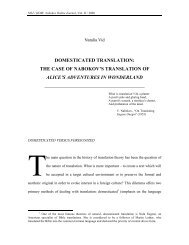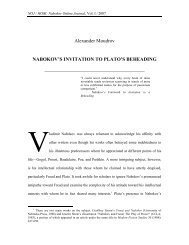Create successful ePaper yourself
Turn your PDF publications into a flip-book with our unique Google optimized e-Paper software.
Nabokov Online Journal, Vol. V (2011)<br />
_______________________________________________________________________<br />
tour books, old tires, and her sobs in the night – every night, every night –<br />
the moment I feigned sleep. (Lolita 176)<br />
In Pera’s novel, Lo’s crying comes across not as an unconscious indictment of Humbert’s<br />
limitations as artist and human being but as a conscious rebellion against Humbert’s<br />
pretenses:<br />
I don’t care one bit about a stupid dance with a stupid Frenchman in a<br />
jacket and bow tie who is pretending to be my father, and as soon as<br />
we get back to the room, in a fury at this ridiculous scene acted out in<br />
front of the exclusive clientele of the hotel with dinner and dancing,<br />
prix-fixe all inclusive, I start crying hysterically and in my frenzy beat<br />
my head against the wall. (Lo’s Diary 138)<br />
The two quoted passages both refer to sobbing. But in Nabokov, Lolita cries in solitude,<br />
waiting till after she thinks Humbert is asleep to give expression and outlet to her distress.<br />
Not meant for an audience, the sobs are a glimpse into that part of Lolita that transcends<br />
her stepfather’s control and design; as such, they are dangerous to Humbert’s self-<br />
conception as artist, if not to the success of his crime. In the second quote, by contrast,<br />
the sobs are ostentatious and forceful, accompanied by strategic wall-banging, which<br />
could draw not only Humbert’s attention but, perilously, that of other hotel guests as<br />
well. While in the second instance, the sobbing has the potential to expose Humbert, the<br />
first describes exposure of a more subtle nature: the hollowness of Humbert’s pretentions<br />
are revealed both to himself and to his readers.<br />
While, as mentioned, Lo’s Diary blurs the distinctions Nabokov draws between<br />
Humbert and Lolita’s mother, Pera’s novel “corrects” the source-text’s doubling of<br />
Humbert and Clare Quilty, here called Gerry Sue Filthy. Not “clearly guilty” (as Appel<br />
[Lolita lx] etymologizes Nabokov’s character), Filthy shares with Humbert neither<br />
pedophilic tendencies nor mock-refinement; his playacting is precisely that – part of his<br />
repertoire as an actor and playwright – rather than the pretension to be someone he is not.<br />
Lo latches on to him as she finds his lack of refinement refreshing, and sees in him<br />
18

















